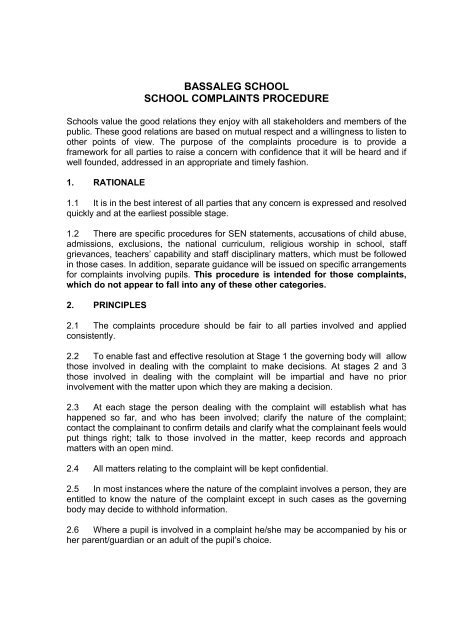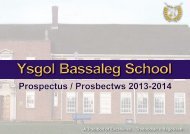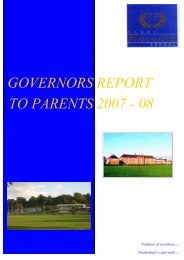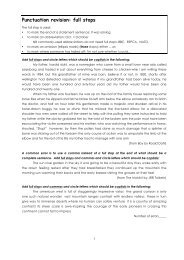BASSALEG SCHOOL SCHOOL COMPLAINTS PROCEDURE
BASSALEG SCHOOL SCHOOL COMPLAINTS PROCEDURE
BASSALEG SCHOOL SCHOOL COMPLAINTS PROCEDURE
You also want an ePaper? Increase the reach of your titles
YUMPU automatically turns print PDFs into web optimized ePapers that Google loves.
<strong>BASSALEG</strong> <strong>SCHOOL</strong><br />
<strong>SCHOOL</strong> <strong>COMPLAINTS</strong> <strong>PROCEDURE</strong><br />
Schools value the good relations they enjoy with all stakeholders and members of the<br />
public. These good relations are based on mutual respect and a willingness to listen to<br />
other points of view. The purpose of the complaints procedure is to provide a<br />
framework for all parties to raise a concern with confidence that it will be heard and if<br />
well founded, addressed in an appropriate and timely fashion.<br />
1. RATIONALE<br />
1.1 It is in the best interest of all parties that any concern is expressed and resolved<br />
quickly and at the earliest possible stage.<br />
1.2 There are specific procedures for SEN statements, accusations of child abuse,<br />
admissions, exclusions, the national curriculum, religious worship in school, staff<br />
grievances, teachers’ capability and staff disciplinary matters, which must be followed<br />
in those cases. In addition, separate guidance will be issued on specific arrangements<br />
for complaints involving pupils. This procedure is intended for those complaints,<br />
which do not appear to fall into any of these other categories.<br />
2. PRINCIPLES<br />
2.1 The complaints procedure should be fair to all parties involved and applied<br />
consistently.<br />
2.2 To enable fast and effective resolution at Stage 1 the governing body will allow<br />
those involved in dealing with the complaint to make decisions. At stages 2 and 3<br />
those involved in dealing with the complaint will be impartial and have no prior<br />
involvement with the matter upon which they are making a decision.<br />
2.3 At each stage the person dealing with the complaint will establish what has<br />
happened so far, and who has been involved; clarify the nature of the complaint;<br />
contact the complainant to confirm details and clarify what the complainant feels would<br />
put things right; talk to those involved in the matter, keep records and approach<br />
matters with an open mind.<br />
2.4 All matters relating to the complaint will be kept confidential.<br />
2.5 In most instances where the nature of the complaint involves a person, they are<br />
entitled to know the nature of the complaint except in such cases as the governing<br />
body may decide to withhold information.<br />
2.6 Where a pupil is involved in a complaint he/she may be accompanied by his or<br />
her parent/guardian or an adult of the pupil’s choice.
2..7 Where a pupil is required to give evidence to a committee at Stage 3, this must<br />
be done voluntarily and with the consent of the parent/guardian in the case of pupils<br />
under the age of 16.<br />
2.8 Complaints will be dealt with as quickly as possible and a time frame given at the<br />
outset. Where an investigation and decision is likely to take longer than originally stated<br />
the governing body will notify each party in writing outlining the reasons for any delay.<br />
Where complaints are received shortly before a school holiday, other than a half-term<br />
holiday, efforts will be made to resolve them before the school closes.<br />
2.9 Anonymous complaints concerning child protection or alleged criminal conduct will<br />
be dealt with in the same way as any other complaint however other anonymous<br />
complaints will only be investigated after due consideration.<br />
2.10 The withdrawal of a complaint will be recorded and acknowledged by letter.<br />
2.11 All parties will be informed of meetings and all may request an adjournment of a<br />
meeting if the timing is inconvenient. However it is not acceptable to repeatedly cancel<br />
meetings as a means of thwarting the process, or an attempt to circumvent stages.<br />
2.12 All parties involved in the complaint may be accompanied by a friend, advocate or<br />
other person at each stage.<br />
2.13 A record of all complaints including those which are anonymous or withdrawn will<br />
be maintained by the school. This record will be made available to the LEA and the<br />
School Inspection Service subject to compliance with the Data Protection Act 1998.<br />
Records of complaints will be retained by the school for five school years including the<br />
year in which the complaint was finalised.<br />
2.14 Reports will be made to the governing body on a termly basis summarising key<br />
trends and issues.<br />
3. RESPONDING TO <strong>COMPLAINTS</strong><br />
3.1 The procedure has three stages.<br />
Stage1 – The complaint is raised with and resolved by the first recipient in the<br />
school.<br />
Stage 2 – The matter is referred to the headteacher for investigation, decision<br />
and resolution.<br />
Stage 3 – The matter is referred to the governing body for investigation,<br />
decision and resolution.
3.2 STAGE 1<br />
A complaint is made orally or in writing to a Head of Year. The first recipient and the<br />
complainant make every effort to resolve the complaint at this stage. If the<br />
headteacher is the first recipient he will decide whether to delegate consideration to<br />
another member of staff.<br />
If the complaint has not been resolved to the satisfaction of the complainant the<br />
member of staff will inform them orally or in writing that they are entitled to take the<br />
complaint to the headteacher. The complainant will be given a copy of the complaints<br />
policy.<br />
3.3 STAGE 2<br />
At this stage the complaint should be made in writing.<br />
On receipt the headteacher will acknowledge the complaint in writing, enclose a copy<br />
of the complaints procedure and give a target date for providing a response, usually<br />
within 10 school days.<br />
The complainant will be given the opportunity to meet the headteacher and other<br />
persons may be present to witness the discussion.<br />
The headteacher will convey his decision in writing to the complainant.<br />
3.4 STAGE 3<br />
If a complainant is not satisfied with the outcome of Stage 2 the governing body will<br />
consider the matter.<br />
The complaint will be heard by the complaints committee.<br />
The clerk to the governing body will acknowledge receipt of a complaint in writing<br />
usually within 5 school days. This letter will set out a time frame for events.<br />
Arrangements will also be made for the governing body complaints committee to meet<br />
to hear the complaint usually within 15 school days of receipt of the complaint.<br />
The clerk to the governing body will contact all those involved in the matter to<br />
ascertain when they will be able to attend. All parties will be given 5 days notice of the<br />
meeting.<br />
The person against whom the complaint is being made will be given sufficient time<br />
usually 10 school days to consider all the evidence and take advice before providing a<br />
response.<br />
Once all the evidence has been presented the complaints committee will consider its<br />
decision in private.
3.5 The committee will consider:<br />
The evidence<br />
Whether the headteacher or others have complied with the school’s complaints<br />
procedure.<br />
Whether there is substance to the complaint.<br />
3.6 The committee will decide upon:<br />
Whether or not the complaint is upheld<br />
Any action to be taken by the governing body, headteacher and/or members of<br />
staff in the light of the decision.<br />
Any recommendations for changes to school policies or procedures.<br />
3.7 The committee’s decision will be sent in writing to the complainant usually<br />
within 5 school days of the hearing and will outline the reasons for the decision and<br />
any remedial action taken by the school.<br />
3.8 Once the decision of the complaints committee is made known, all parties<br />
should have understood the reasons for the decision and be satisfied that even if they<br />
have not been successful the hearing was a fair one.<br />
3.9 The school procedures provide for an appeal stage. The letter stating the<br />
decision of the complaints committee will therefore also contain:<br />
A statement of the right to appeal, together with the address of the clerk to the<br />
governing body.<br />
The date by which any notice of appeals needs to be lodged i.e. 15 school days<br />
after the day on which notice in writing was given of the committee’s decision<br />
A statement that any appeal must set out the grounds on which it is made.<br />
4. APPEALS CONSIDERATION<br />
4.1 The appeals committee will meet to consider an appeal, no later than the 15 th<br />
school day after the day on which the appeal was lodged.<br />
4.2 Membership of the appeals committee will be different from the membership of<br />
the complaints committee.
4.3 The chair of the appeals committee will circulate all written evidence to all<br />
parties usually 5 school days before the hearing.<br />
4.4 Written evidence will include the statement of decision by the complaints<br />
committee, the notice of appeal, which gives grounds for the appeal and any written<br />
representations from any party.<br />
4.5 Proceedings for the appeals committee will be the same as for the complaints<br />
committee.<br />
4.6 The appeals committee should attempt to secure closure of the complaint. If the<br />
complaint is not upheld, the decision letter will make clear:<br />
That the complaint has been thoroughly investigated<br />
The governing body and the headteacher will not reopen the matter<br />
Any new issues will not mean re-opening an already determined complaint<br />
If new issues arise these will be treated as a new complaint but only if they are<br />
demonstrably different from matters under previous complaint.<br />
4.7 The letter may also explain that the LEA can review the procedures used by the<br />
governing body but not their decision.
5. ROLES AND RESPONSIBILITIES<br />
5.1 Role of the Governing Body<br />
Complaints, if dealt with properly, can enhance the reputation of the school. The<br />
governing body has an important role to play in handling complaints well.<br />
Although the headteacher has a role in hearing complaints, adjudicating and deciding<br />
on what action should be taken, the ultimate responsibility lies with the governing<br />
body.<br />
The governing body has no role at the first stage of the complaints procedure. The<br />
Chair of Governors may not be formally involved at this stage unless the complaint is<br />
about the headteacher.<br />
5.2 Role of the Chair of the Complaints Committee<br />
The Chair plays a key part in clarifying the facts of a complaint and ascertaining<br />
whether there are grounds for upholding the complaint. The Chair will introduce all<br />
those who are involved in the matter and will explain that the committee is impartial.<br />
He/she will also ensure that the issues are addressed, key findings of fact are made<br />
and that those who may not be used to speaking in such circumstances are put at<br />
their ease. In addition, the Chair will ensure that the hearing is conducted in an<br />
informal manner with each party treating the other party with respect and courtesy,<br />
ensure that each party has put their case without undue interruption and that there is<br />
no cross examination of individuals.<br />
5.3 Role of the LEA<br />
The LEA does not have a statutory role in resolving complaints about schools. The<br />
statutory responsibility rests with the governing body. The LEA may however be asked<br />
to assist in investigating a complaint or to give advice on the handling of a complaint<br />
or advice on the response to a complaint.
6 RECORDING AND MONITORING <strong>COMPLAINTS</strong><br />
6.1 A record of complaints is important because it enables the school to monitor the<br />
progress of a complaint, provide evidence that the complaint has been considered and<br />
the outcome noted. In addition, it enables the school to identify trends and recurring<br />
themes in complaints cases.<br />
6.2 Anonymous, Withdrawn, Frivolous or Malicious Complaints<br />
The record will include:<br />
A description of the complaint<br />
Whether the complaint was investigated or just recorded<br />
The outcome of any investigation<br />
Identified issues for action<br />
6.3 Stage 1 Records<br />
Records for Stage 1 complaints will include:<br />
The name of the complainant<br />
Date of receipt of the complaint<br />
A brief description of the complaint<br />
Action taken to resolve the complaint and outcome<br />
Identified issues for action<br />
6.4 Stage 2 Records<br />
Records for Stage 2 complaints will include:<br />
The name and address of the complainant<br />
Date and details of the complaint<br />
Action taken to resolve the complaint and a written record of discussions,<br />
interviews and evidence collated<br />
Outcome<br />
Date of notification to the complainant<br />
Identified issues for action
6.5 Stage 3 Records<br />
Records for Stage 3 complaints will include:<br />
A full account of the proceedings of the complaints committee, evidence<br />
presented and all other relevant documentation.<br />
Decision reached and any action to be taken by the school, headteacher,<br />
governing body or member of staff.<br />
Date of the decision and the date the decision letter was sent to the<br />
complainant.<br />
Identified issues for action
7. ADAPTATIONS TO THE <strong>COMPLAINTS</strong> <strong>PROCEDURE</strong><br />
7.1 <strong>COMPLAINTS</strong> CONCERNING THE <strong>COMPLAINTS</strong> OFFICER – If a complaint<br />
concerns the Complaints Officer, it should be passed to the headteacher who will<br />
either delegate the investigation to another senior member of staff under stage 1 of<br />
the procedure or investigate the complaint himself under stage 2. If the complainant is<br />
not happy with the outcome, they may write formally to the chair of governors in<br />
accordance with stage 3 of the procedure.<br />
7.2 COMPLAINT AGAINST THE HEADTEACHER – If a complaint is against the<br />
headteacher, the first recipient will refer it to the chair of governors. The chair of<br />
governors will decide whether the matter is for consideration under the complaints<br />
procedure, ascertain whether it needs to be referred to other authorities and finally<br />
decide whether he needs to delegate the matter to another member of the governing<br />
body in the light of prior involvement. Such an investigation will be carried out as at<br />
stage 2 of the procedure. If the complainant is not happy with the outcome, they will<br />
be advised to write to the vice chair, if the chair investigated at stage 2, or the chair, if<br />
another delegated governor investigated at stage2. The matter will then be referred to<br />
the chair of the complaints committee in accordance with stage 3 of the procedure.<br />
7.3 COMPLAINT AGAINST THE CHAIR OF GOVERNORS – If a complaint<br />
concerns the chair of governors, it will be sent to the vice chair who will inform the<br />
headteacher and the LEA. The vice chair will ascertain whether the matter needs to be<br />
referred to other authorities, whether to seek advice from the LEA and whether he/she<br />
needs to delegate the matter to another member of the governing body. Such an<br />
investigation will be carried out at stage 2 of the procedure. The vice chair can refer<br />
the matter directly to the complaints committee for investigation and consideration.<br />
Such an investigation will be carried out in accordance with stage 3 of the procedure.<br />
The matter should not be brought to the attention of the full governing body until the<br />
matter has been considered by the complaints committee and any appeal committee.<br />
7.4 <strong>COMPLAINTS</strong> AGAINST THE HEADTEACHER AND THE CHAIR OF<br />
GOVERNORS – If a complaint concerns the headteacher and chair of governors, it<br />
should be sent to the vice chair of governors who will inform the LEA. The vice chair<br />
will ascertain whether the matter needs to be referred to other authorities, whether to<br />
seek advice from the LEA and whether he/she needs to delegate the matter to<br />
another member of the governing body. Such an investigation will be carried out at<br />
stage 2 of the procedure. The vice chair can refer the matter directly to the complaints<br />
committee for investigation and consideration. Such an investigation will be carried out<br />
in accordance with stage 3 of the procedure.<br />
7.5 COMPLAINT AGAINST THE CHAIR AND VICE CHAIR OF GOVERNORS – If<br />
a complaint concerns the chair and vice chair of governors, it should be sent to the<br />
clerk of the governing body who will refer the matter to the complaints committee. The<br />
chair of the complaints committee will inform the LEA and organise a meeting of the<br />
complaints committee in accordance with stage 3 of the procedure. If the chair of the<br />
complaints committee is either the chair or vice chair of governors, the chair of the
complaints appeal committee will become the chair of the complaints committee and if<br />
necessary a new chair will be appointed for the complaints appeal committee.<br />
7.6 COMPLAINT AGAINST A GOVERNOR OR GROUP OF GOVERNORS – If a<br />
complaint concerns a governor or group of governors, it should be referred to the chair<br />
of governors. The complaint will be dealt with in the same way as a complaint against<br />
the headteacher. If the chair and vice chair of governors are involved in the group, the<br />
complaint will be referred to the chair if the complaints committee or other appropriate<br />
governor in accordance with stage 3 of the procedure. Impartiality must be maintained<br />
at all times.











